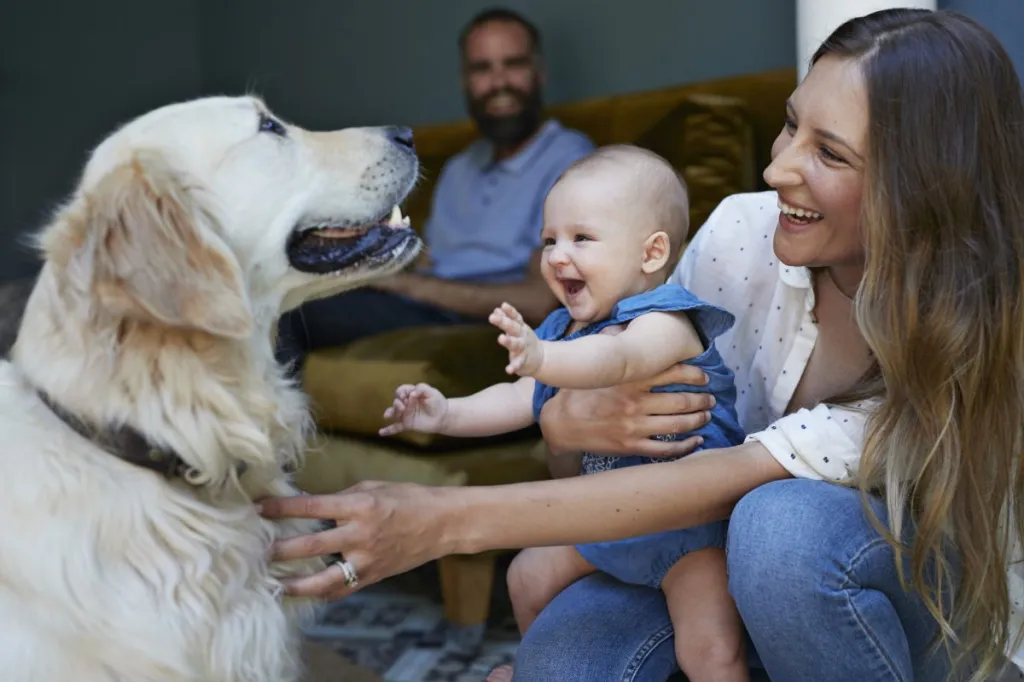There’s a short developmental window in every dog’s life when they’re extremely sensitive to their environment. The number of positive encounters they have with other people and dogs during this period, which ranges from just a few weeks old to 3 or 4 months of age, can dramatically influence how friendly they are as an adult. That’s why it’s crucial to be intentional about raising a people-friendly dog.
If you’re getting a puppy, look for one who’s been raised around people. Once you get your pup or dog, regardless the age, introduce them to lots of different people.
Admittedly, parents of young pups are in a bit of a catch-22. During that developmental window when you should be introducing your puppy to all sorts of people, they’re too young to walk around in public places. This is because they’re still vulnerable to catching canine diseases. The solution? Bring the people to your puppy, and throw lots of puppy parties.
How to host a puppy party
- Invite all types of people, starting with mellow ones who know how to behave around dogs. Make sure to include men and kids on the guest list — two types of people that often scare dogs who aren’t used to them. (This is important even if you don’t have kids. Sooner or later your pup is going to encounter children, and you want to make sure they know how to act. Most dog bite victims are children. Yet another reason to work on raising a people-friendly dog!)
- Mix up the guest list often. Inviting over the same group of friends week after week won’t do it. If your puppy’s going to learn how to behave around strangers, they need to meet unfamiliar people. So use this as an excuse to give your social life a boost: invite friends, relatives, neighbors, and coworkers.
- Make it a learning experience for your pup. Encourage guests — including the kids — hand-feed your dog, practice some basic commands, and give your pup lots of pets and cuddles. This will get your dog used to being handled (future vets and groomers will thank you). If your guests reward him with a treat or piece of kibble after each exercise, your pup will probably conclude that humans are a pretty nice bunch.
- The ideal scenario would be to throw a puppy party every day. Yes, every day, from the day you bring your pup home until they’re 3 or 4 months old. But unless you’re a professional socialite, you may find that a bit daunting. A good goal is three times a week. And even once a week is better than nothing.
- Take your pup out and about. Even if your pup is too young to be on the ground in public places, you can still take them out in a carrier — to a café, to work, to the park, for a stroll around the neighborhood. Any exposure they get to people will help, so long as it’s positive.
How to teach your puppy not to bite
Other dogs do most of the work here. When puppies play-fight, they teach each other not to bear down with their jaws when they bite. If a puppy bites too hard in play, the bitten one will yelp and take time out from the game to lick their wounds. The biter soon learns that if they want the game to keep going, they need to mouth gently, not bite. Trainers call this “bite inhibition.”
Reinforce bite inhibition when you’re playing with your puppy. When your young pup mouths you, respond with a yelp or “Ouch!” Then stop playing and ignore your pup for a minute or two. When you’re ready to start playing again, ask your pup to sit to reassert your control, then continue the game.
Learn to give time-outs. If your pup ever ignores your yelp of protest and keeps gnawing on you, give them a time-out. Stand up, walk out of the room, and leave them alone for a few minutes. You’re teaching them the same thing their puppy playmates do: If they bite, the fun ends.
Make sure your children know how to react to biting and mouthing. And watch to make sure they really do end the game when the puppy starts chewing on them. You want to be sure your puppy knows that kids are people too, and they need to treat the children gently.
With a little forethought and training, you can raise your puppy to become a people-friendly dog.









